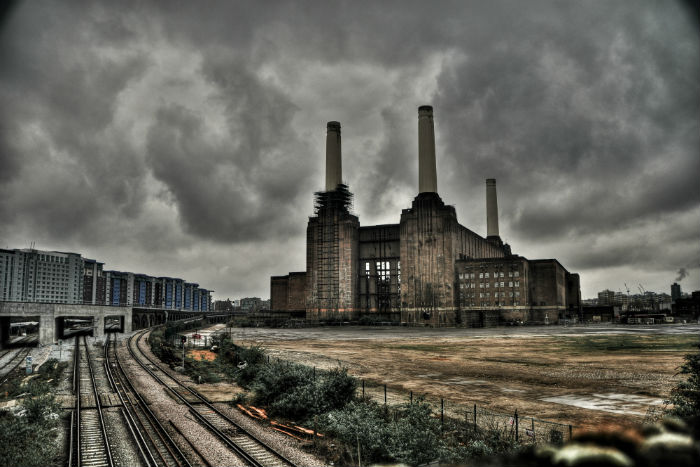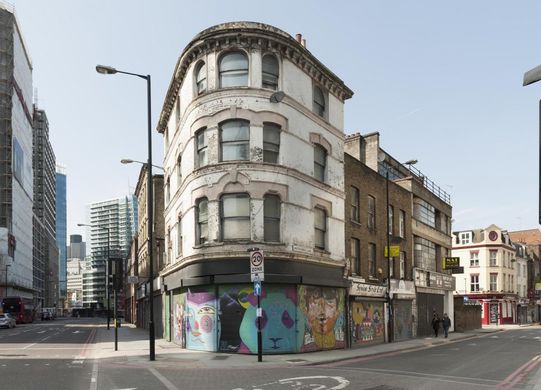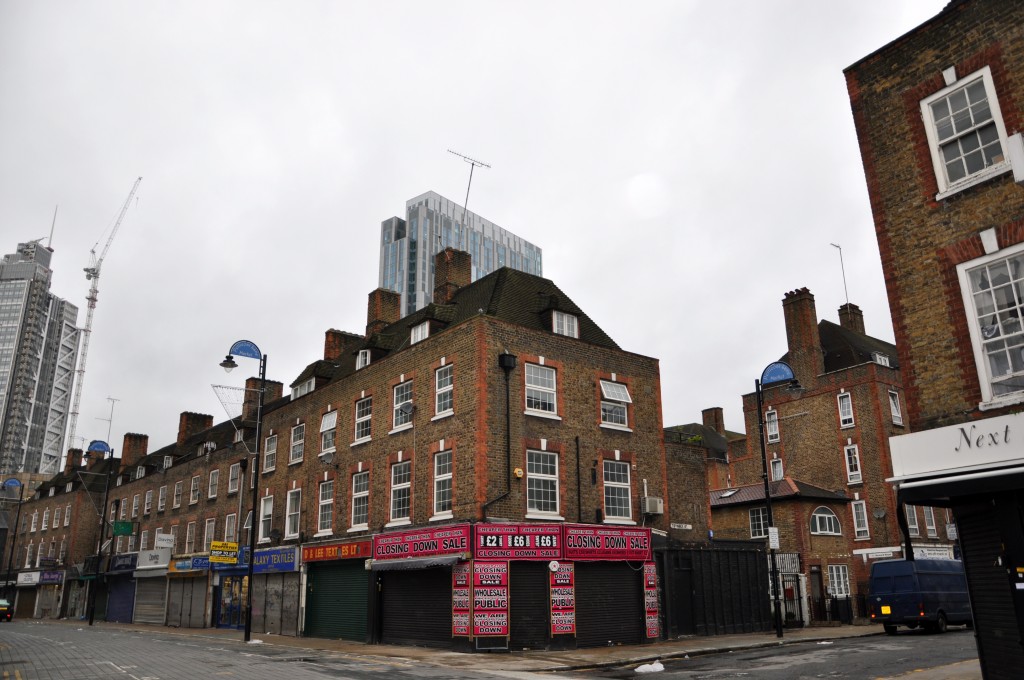These are some notes on rambling in the U.K. that didn’t make it into previous postings:
Battesea Power Station
 In London, I chanced to come near the massive bulk of the old Battersea Power Station. This huge structure is familiar to anyone who has a copy of Pink Floyd’s Animals, where it’s used in the cover art. Now it’s in the process of being torn down. For once, I deeply regretted not having a camera with me. I will not be able to find any photographs of it in this particular stage of demolition, where it looks like a diplodocus, supine and partially dismembered by a T‑rex.
In London, I chanced to come near the massive bulk of the old Battersea Power Station. This huge structure is familiar to anyone who has a copy of Pink Floyd’s Animals, where it’s used in the cover art. Now it’s in the process of being torn down. For once, I deeply regretted not having a camera with me. I will not be able to find any photographs of it in this particular stage of demolition, where it looks like a diplodocus, supine and partially dismembered by a T‑rex.
Whitechapel
 The district of Whitechapel is famous as the locus operandi of Jack the Ripper. It was a poor district in his time, and it’s a poor district now, with litter-filled streets, crumbling housing, and dreary blocks of council flats. It’s now inhabited mostly by Muslim immigrants. But it has a vibrant street life, and the campus of London University is embedded within it. I found it quite interesting. The real shabbiness of the inhabitants mixed uneasily with the faux-shabbiness of the middle class students. No tourists, anywhere that I could see.
The district of Whitechapel is famous as the locus operandi of Jack the Ripper. It was a poor district in his time, and it’s a poor district now, with litter-filled streets, crumbling housing, and dreary blocks of council flats. It’s now inhabited mostly by Muslim immigrants. But it has a vibrant street life, and the campus of London University is embedded within it. I found it quite interesting. The real shabbiness of the inhabitants mixed uneasily with the faux-shabbiness of the middle class students. No tourists, anywhere that I could see.
As one would expect near a campus, there was one of those pathetic “radical“ bookshops. This really saddened me. It contained nothing but the same old stupid garbage that composes the traditional furniture of intellectual wankerdom: the moronic racist rantings of Karl Marx, the pedantic fabrications of Noam Chomski, the inevitable faded volumes from a hundred years of incoherent incompetence. In other words, nothing even remotely radical, progressive, or of any intellectual worth. What saddens me is that all this dreadful rubbish continues to waste the time of earnest students, and probably well-intentioned people, generation after futile generation, crowding out any intelligent material that might actually be useful to them. We live in a truly conservative society when this stale stuff is thought to be radical.
 I can see that Whitechapel is likely to be a recruiting ground for the various sects of destructive Islamism. No doubt most of the Muslim families are respectably and harmlessly pious, but the hordes of unemployed and underemployed teenagers I could see wandering aimlessly in the streets must be easy prey for the political terror movements. I could see instantly that there was a profound difference between the Muslim communities of Canada and Britain.
I can see that Whitechapel is likely to be a recruiting ground for the various sects of destructive Islamism. No doubt most of the Muslim families are respectably and harmlessly pious, but the hordes of unemployed and underemployed teenagers I could see wandering aimlessly in the streets must be easy prey for the political terror movements. I could see instantly that there was a profound difference between the Muslim communities of Canada and Britain.
In Canada, the typical Muslim family earns more than the national average. It is a community primarily composed of professional people, or small business people, who have built for themselves a solid place in Canadian society. There are several Muslims in Parliament, often representing districts that are not especially populated by Muslims. There are some less well-off people in the community, usually recent immigrants from Somalia or other poor countries, but they are obviously on the same ladder of upward mobility that many other immigrants to Canada have climbed. Some people, in small places, are no doubt puzzled by or even made suspicious of Muslims by news of Islamist extremism, but in any large town or city, nobody gives that stuff a second thought. I work in a dental laboratory, where there are half a dozen Muslims among a staff of twenty. One small Canadian town — one that did not actually contain a single immigrant — was cursed with a town council yokel who wanted to pass a resolution denouncing bizarre fantasies that he imagined were Islamic custom. The town quickly became a national laughing stock. The traditional Canadian attitude of minding one’s own business and letting people do as they please without meddling has not altered . The supposed “conflict of civilizations“ ballihooed by the press in other countries is seen by most Canadians as nothing more than the usual immigrant story, celebrated in the popular television comedy series Little Mosque On the Prairie,
But what I saw in Whitechapel was something entirely different. It looked to me like a community of unwelcome foreigners, stifled and idle in a ghetto. Elsewhere in Britain, I’m sure, there are many Muslims whose experience is closer to the Canadian pattern. But here, I could see bitterness, tension, and alienation. Cultivating an Underclass is a bad idea, in any society. Coupling an underclass with a religious division is a recipe for disaster. It does not help that one is constantly being bombarded with warnings and precautions about terrorism, and that the terrorist predations in the U.K. have been real and damaging.
I hear repeated references to “multiculturalism“ in Britain, but the word seems to have a different flavour here than back in Canada. In Britain, it seems to refer to government and institutional efforts to get Britons to accept Muslims as fellow-citizens, or at least to tolerate their presence. In Canada, acceptance is taken more or less for granted. The word in Canada refers to the efforts of immigrant community organizations to preserve and transmit the elements of traditional cultures to the generation born and raised in Canada. One usage presumes that assimilation is difficult, the other that it is so swift and effective that there is a danger that parents and children might not understand each other. But the two countries have such profoundly different histories and social systems that the different attitudes and results are understandable.
A Cardiff Bookshop
In Cardiff, there was a really fine second-hand bookshop. Not an impeccably proper one with varnished bookcases and cabinets, but a dusty, messy one, with books stuffed higgledy-piggledy onto rickety shelves. The owner told me that the musty, Victorian-era arcade which it inhabited is soon to be refitted to accommodate trendy boutiques and bar-cafés, so he is not likely to remain there much longer. In the dusty chaos of this shop, I saw book after book that I would love to own. A three-volume translation of Gregory of Tours into modern French, for five pounds. A treatise by Charles Williams, the “inkling“ friend of J. R. R. Tolkien and C. S. Lewis. A Buckridge Jennings novel that my friend Isaac would love (unfortunately, in a first edition that went for thirty pounds). I felt embarrassed to browse so long and buy nothing, so I picked up a copy of Captain Marryat’s The Settlers In Canada for a few pence. This is charming tale of an English family settling in the wilds near what is now quiet town of Brockville, Ontario, but in 1844, it could still be done up as a perilous wilderness suitable for the adventure fantasies of British boys.
0 Comments.